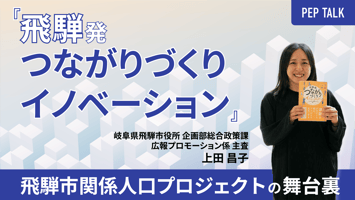PEP Talk "Hida-Originated Connection-Building Innovation" is now available.
An interview with Ms. Momoka Emori and Ms. Rion Kawasaki, the authors of "Why Do Rural Girls Not Aim for the University of Tokyo?", is now available
PEP Talk "Why Do Rural Girls Not Aim for the University of Tokyo?" is now available.
Discover the video and the summary below.
Interview Summary
Disclaimer: This English summary of the Japanese interview transcript was generated by an AI language model. While efforts have been made to ensure the accuracy of the translation, please be aware that some details may be inaccurate or misinterpreted. We advise readers to refer to the original Japanese video for the most accurate and authoritative source of information. Citing this AI-generated transcript is not recommended for academic or professional purposes. This translation is provided for informational and convenience purposes only.
Ms. Emori and Ms. Kawasaki, while studying at the University of Tokyo, questioned the disproportionately small number of female students from rural areas and believed that there might be structural issues behind this phenomenon. Based on this hypothesis, they established the #YourChoiceProject, which conducts research on the advancement of rural girls, mentoring programs, and policy advocacy activities. They aim to identify the gender gaps and challenges faced by rural female students in their career choices and propose solutions.
Book: "Why Do Rural Girls Not Aim for the University of Tokyo?"
This book is based on survey results conducted in 2023, analyzing the unique challenges faced by rural female students through a quantitative survey of approximately 4,000 high school students. The survey explores differences in awareness and challenges that rural female students face when considering higher education and presents solutions to these issues.
Survey Results and Significance
The survey highlighted tendencies among rural female students to undervalue themselves and differences in educational aspirations compared to those in metropolitan areas. These findings clarified the unique challenges faced by rural female students, leading to proposed concrete solutions. Ms. Emori and Ms. Kawasaki are using these survey results to engage in policy advocacy efforts to raise awareness of this issue.
Future Prospects
Looking ahead, they are considering new initiatives such as raising awareness among parents and expanding mentoring programs. They also aim to broaden efforts through policy advocacy activities. They hope their activities will influence society as a whole and are actively seeking collaborators and partnerships.
Content Discussed in the Interview
The interview delved into the background of the project’s establishment and the process of writing their book. Ms. Emori and Ms. Kawasaki expressed that their personal experiences led them to recognize the challenges faced by rural female students, prompting them to start this project as a societal issue. They also emphasized their efforts to use survey data for policy advocacy to increase awareness of this problem.
Survey Methods and Their Importance
Data was collected from about 4,000 high school students, leading to detailed analyses of the issues identified. This data is also used for policy advocacy, underscoring its importance. Ms. Emori and Ms. Kawasaki hope that insights gained from both quantitative data and qualitative interviews will be utilized by many people and organizations
.
In Conclusion
The interview conveyed expectations that this project and book would impact many people. They argue that deepening societal understanding of this issue through their activities is crucial, encouraging everyone to start with what they can do individually.


